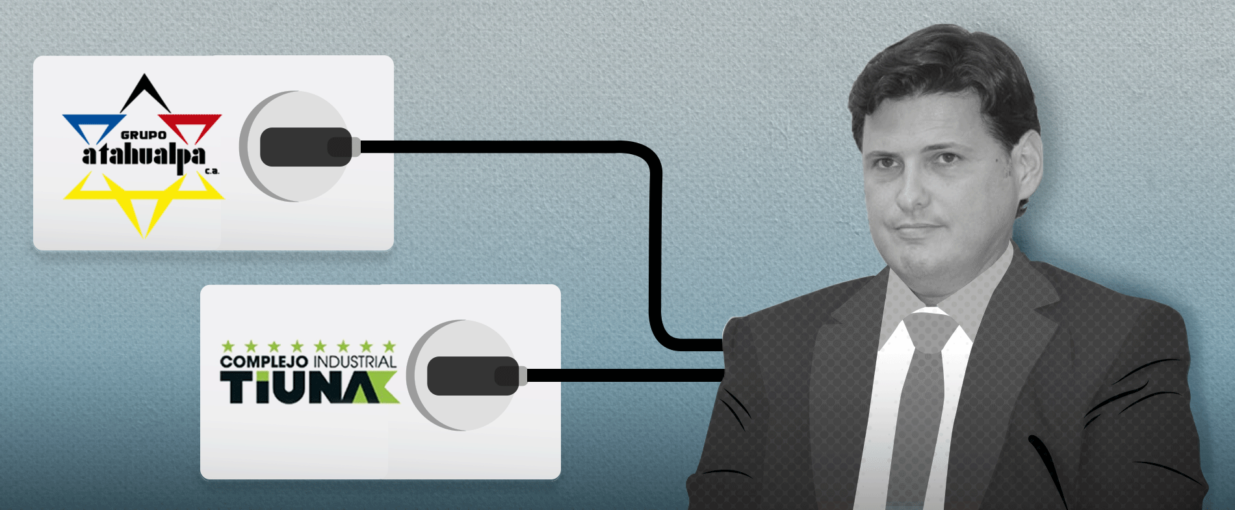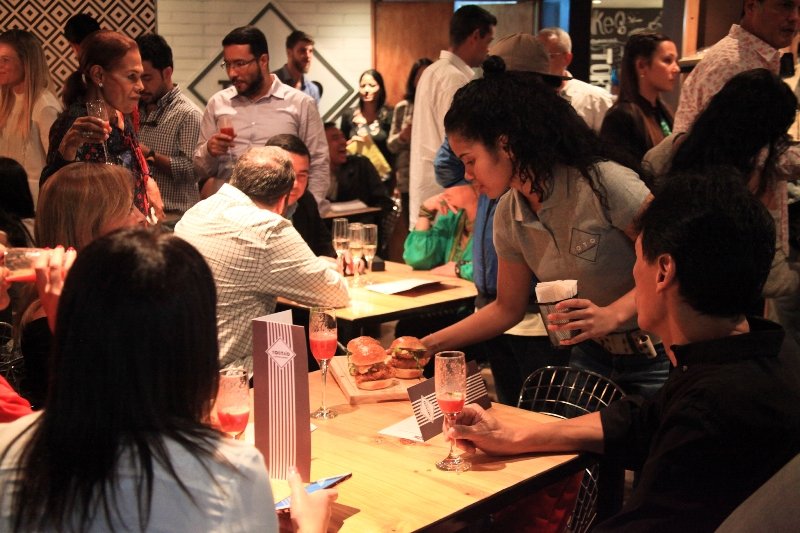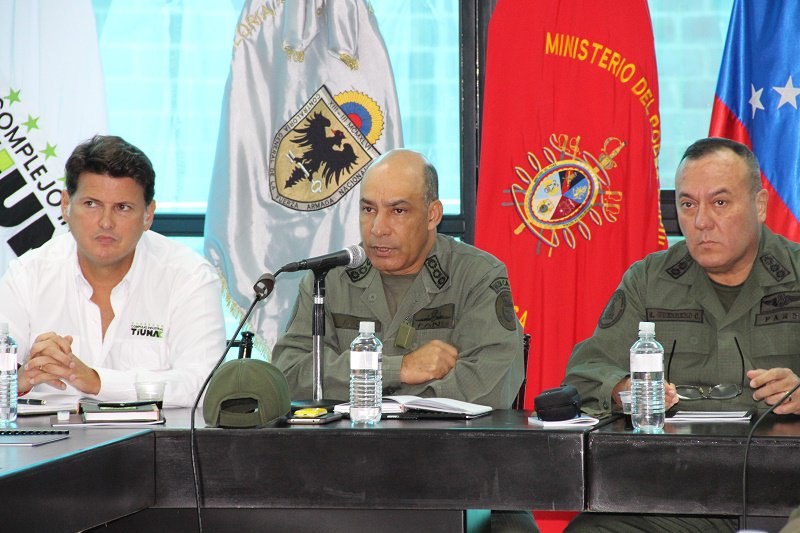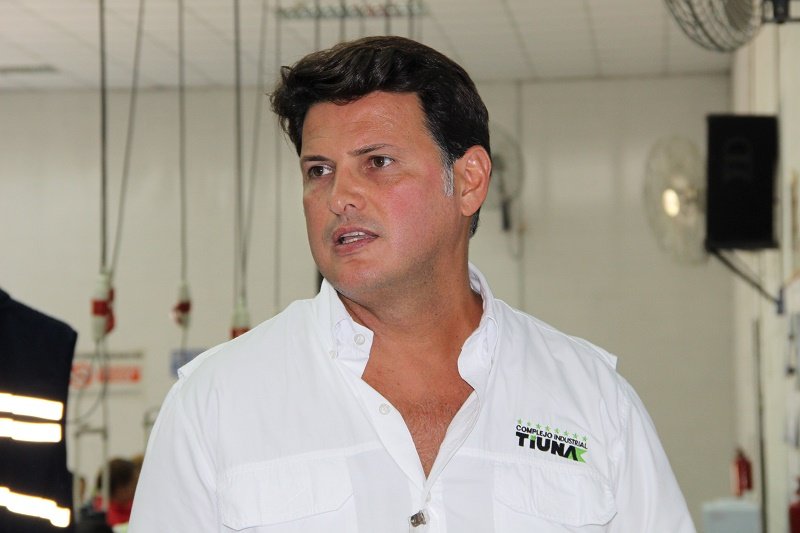

In business, the entrepreneurs who have amassed fortunes to the rhythm of the schizophrenic chavista economy stand out. A Peruvian-Spanish citizen has developed a real emporium in the last 13 years. Once pointed out as the potential financial channel between the Venezuelan government and the Spanish political party Podemos, it could only be confirmed that he works shoulder to shoulder with the military and every day incorporates new businesses to his emporium. Atahualpa Fernández continues to gain ground among the entrepreneurs protected by the ruling party.
|
Getting your Trinity Audio player ready...
|
In financial operations, Atahualpa Fernández Arbulu is an expert in business multiplication. In the decadent Venezuelan economy, two of his new ventures, Tosta'o Coffee Market and Kenco Estudio Creativo flourish against any forecast, no matter how bad it may be. These companies were born in the worst years of the crisis in Venezuela and with an unexpected expansion under way. His secret is the close alliances with chavismo.
None of his projects has decreased in the self-styled Bolivarian revolution. There is a recent complaint of plagiarism of the concept against the cafeteria, located in eastern Caracas, filed by the famous food chain Tostao' Café & Pan, of the BBI International group and originally from Colombia. But Fernandez is unconcerned. He knows that his version, already operative and opened in September by the Ministry of Tourism of Venezuela —led by Marleny Contreras, wife of Diosdado Cabello, the powerful number two of chavismo, current deputy of the pro-government Constituent Assembly—, is just beginning its growth in a commercial alliance with the Venezuelan state institution of tourism (Venetur). "Everyone has won more than ever with this revolutionary process. Evidently under the laws," Fernandez revealed in March in an interview to the main channel of the State, Venezolana de Televisión, during the celebration of the Power Expo 2017, a fair designed to publicize the relationships of the government of Nicolás Maduro with the private sector.

Fernandez's is not an idyllic run of luck. Its thriving companies have had the backing of the Chavez government since 2004. It was that year when he began to undergo a transformation from a modest merchant to a corporate leader in the South American country. He had registered, then, with his current wife, Darin Wahbeh Saroukhan, the Atahualpa Group.
The muscle of its business activities has been the military. In Fuerte Tiuna, the main military installation in the country, in the southwest of Caracas, he developed the Tiuna Industrial Complex I. There, in the heart of the barracks that serves as headquarters for the Ministry of Defense, operates his drinking water bottling plant and its textile factory; both make up the Atahualpa Group in an unusual location.
Among his other companies in Venezuela, there is Representaciones y Servicios ADWD, Distribuidora Todo Sur, Texticentro II, Servicios Industriales El Gran País, Productos Serigráficos Atahualpa. While his favorite clients include Banco de la Fuerza Armada Nacional Bolivariana, Petróleos de Venezuela, the National Electoral Council (CNE), Sidor (Siderúrgica del Orinoco "Alfredo Maneiro"), the National Telephone Company of Venezuela (Cantv), Movilnet, Government of the Capital District, Corporación Venezolana de la Juventud Productora (Venezuelan Corporation of Producing Youth), Ministry of Communes, Venezuelan Institute of Social Security (IVSS), among other state-dependent agencies.

His brand stood out in the 2013 presidential campaign. That year, his backpacks —designed by the Atahualpa Group with the omnipresent eyes of Hugo Chávez as logo or motif— were distributed among thousands of citizens to promote the successor of the leader of the revolution, Nicolás Maduro. Two years later, the businessman was portrayed along with senior officials of the Bolivarian National Armed Forces to promote bottles of mineral water that, in alliance with Compañía Anónima de Industrias Militares (Cavim), would supply the Venezuelan market. It had been the cut-off point for Fernández not to continue being the figure behind his products, but rather a brand of the chavista process.
Outside the corporate closet, Fernández insists on showing a fresh face. He shows a group of uniformed men who won in October, and for the ninth time, a softball tournament held in the Dominican Republic. It is the "Bandidos de un Solo Brazo" team from Venezuela, sponsored by its company Complejo Industrial Tiuna I, which has defeated its adversaries. The sport is one of the countless hobbies he shares with former president Chávez. The rest are his leftist doctrines, his passion for the military and a pretense to highlight the social aspect. That is his speech in front of the television cameras and the written press. His comments focus on applauding the work of Venezuelan socialism in almost all his interviews.
Like Tosta'o Coffee Market, Kenco design agency has also shown an emerging advertising potential. Its director and co-founder, Karen Cortés, niece of the Minister for Communication and Information, Ernesto Villegas Poljak, opened in September a new branch in La Castellana, in eastern Caracas, where they provide services ranging from flat to canvas printing.
Fernández has been engaged in founding companies with his wife. The business purposes vary: textile production, food service, beverage manufacturing, design, and creative advice. Some companies and properties are established in Venezuela, others in foreign lands like the Dominican Republic, Peru, United States of America and Spain. The good sense of this businessman has been productive even in times of revolution. He was part of a top-class that emerged in the Chávez government which, for more than ten years, made him a beneficiary of the desired preferential dollars granted by Cencoex (National Foreign Trade Center), former Cadivi (Foreign Exchange Administration Commission), an institution currently investigated by the Prosecutor's Office for having disbursed millions of dollars to cash shell companies or that simply incurred in exchange crimes between 2011 and 2014.

The destiny of the dollars granted by the governing body of foreign currency to Fernandez - over 7.5 million in the decade from 2004 to 2014 - has also been a matter to be investigated in the ranks of the Venezuelan opposition. In 2015, Julio Montoya, deputy of the National Assembly, blamed the businessman and his partner Luis Eduardo Álvarez, a relative of former vice president and current foreign minister Jorge Arreaza –son-in-law of Commander Chávez-, for being the financial bridge in Venezuela of the Podemos political party in Spain. "If you check their records, you will find the links with Podemos," he said in an interview with Madrid's ABC newspaper. "Atahualpa's shell companies maintain active contacts in Spain, where he owns companies in association with José María Rubio Hermoso de Mendoza, the administrator of Fórmula Cuatro Televisión and Medios SL, and also a member of Royal Spanish Automobile Federation and Formula 4 Ibérica SL."
Fernández lives in Madrid with Wahbeh Saroukhan and his two sons. In Spain, he and his wife run several businesses. Before his frantic economic expansion, he was in the shadows. His father, Senen Fernández Delgado, a Spaniard and founder of the Communist Party of Bolivia, had migrated to Venezuela in October 1983 with his Peruvian wife Rosa Alburu and their five children. The family was avoiding the economic crisis in Peru, having phlegmatic beginnings in Caracas.
Atahualpa, raised in a middle-class home, was engaged in the textile industry. He was a fabric cutter, initially, in the center of the capital of Venezuela. "I became a mechanic of sewing machines at 16 years old. I got to master the trade by being consistent. I suffered hardships, but I had the good fortune to meet good people along the way who offered me a hand," he said in a review published in August in his blog "Atahualpa Fernández Arbulu."
Former combatants of what was the largest guerrilla in Latin America - who separated from the peace agreement signed in 2016 - are in a process of transition and rearrangement of criminal structures, where illicit drug trafficking and illegal mining continue to be the main focal points, now in Venezuelan territory. They have met with indigenous peoples and communities in Amazonas to formalize their presence in the territory, affirming that they have the support of the Venezuelan Government. But they also move to lands of the Orinoco Mining Arc, where they even control coltan mines.
The main newspaper of the center of Venezuela and second of the country, 'Notitarde', was the setting for an experiment, a unique even for the Chavista era, with a clear military imprint. An Army colonel took over the company. It was part of the nervous media acquisition spree by capital close to the revolution from 2013 to 2015. The results, journalistic and business-wise, fall short of the expectations. However, the graduation classmate of Carlos Osorio and Pedro Carreño still wants to learn from the reporters at his service.
The fine line that separates Norte de Santander and Venezuela hides burial grounds of disappeared people from both sides, victims of violence by illegal armed groups that move at ease between both countries. Their relatives travel through trails, sidewalks and even cemeteries on the Venezuelan side, in search of their missing ones, without the help of any government.
José Gregorio Vicari Méndez, an assimilated physician of the Bolivarian Army, was the successful owner of Proveeduría Médica VDS, a medical supplies company that signed hundreds of contracts with the health office during the oil boom. This finding is part of a database developed by Armando.info with the public information contained in the National Register of Contractors. Although the Organic Law of the Office of the Comptroller states that an active official could have administrative responsibility if entering into contracts with the State, Vicari Méndez, who is no longer a member of the company, presents an argument in his defend that goes beyond the tragedy of Venezuela's shortages. "If I have a patient with a requirement, if there is no material, but I know where there is, I look for it. What should I do? Should I not operate?
In the Bolivarian Revolution of Venezuela, which has a strong military component, military officers can act, simultaneously or progressively, even in contravention of the law, as troops leaders, government executives and even state contractors. One in three of the 785 military officers active in their time who, as private, contracted with the public administration during the last ten years, did it from companies that have the social purpose of construction. One case stands out: Major General Frank Herbert Lynch Dávila. The family company of which he is part has received contracts for construction works for years while the officer escalated positions until being in charge of the cement supply throughout the country.
The porous border has loaded the inhabitants of the Colombian Amazon with the cases of its Venezuelan neighbors. Shortage and indifference has led patients to seek treatment even in Bogotá. Meanwhile in San Fernando de Atabapo, the transmitting mosquito has folded people back into their homes. But "God exists." So says a mural that receives visitors at the port.
When Vice President Delcy Rodríguez turned to a group of Mexican friends and partners to lessen the new electricity emergency in Venezuela, she laid the foundation stone of a shortcut through which Chavismo and its commercial allies have dodged the sanctions imposed by Washington on PDVSA’s exports of crude oil. Since then, with Alex Saab, Joaquín Leal and Alessandro Bazzoni as key figures, the circuit has spread to some thirty countries to trade other Venezuelan commodities. This is part of the revelations of this joint investigative series between the newspaper El País and Armando.info, developed from a leak of thousands of documents.
Leaked documents on Libre Abordo and the rest of the shady network that Joaquín Leal managed from Mexico, with tentacles reaching 30 countries, ―aimed to trade PDVSA crude oil and other raw materials that the Caracas regime needed to place in international markets in spite of the sanctions― show that the businessman claimed to have the approval of the Mexican government and supplies from Segalmex, an official entity. Beyond this smoking gun, there is evidence that Leal had privileged access to the vice foreign minister for Latin America and the Caribbean, Maximiliano Reyes.
The business structure that Alex Saab had registered in Turkey—revealed in 2018 in an article by Armando.info—was merely a false start for his plans to export Venezuelan coal. Almost simultaneously, the Colombian merchant made contact with his Mexican counterpart, Joaquín Leal, to plot a network that would not only market crude oil from Venezuelan state oil company PDVSA, as part of a maneuver to bypass the sanctions imposed by Washington, but would also take charge of a scheme to export coal from the mines of Zulia, in western Venezuela. The dirty play allowed that thousands of tons, valued in millions of dollars, ended up in ports in Mexico and Central America.
As part of their business network based in Mexico, with one foot in Dubai, the two traders devised a way to replace the operation of the large international credit card franchises if they were to abandon the Venezuelan market because of Washington’s sanctions. The developed electronic payment system, “Paquete Alcance,” aimed to get hundreds of millions of dollars in remittances sent by expatriates and use them to finance purchases at CLAP stores.
Scions of different lineages of tycoons in Venezuela, Francisco D’Agostino and Eduardo Cisneros are non-blood relatives. They were also partners for a short time in Elemento Oil & Gas Ltd, a Malta-based company, over which the young Cisneros eventually took full ownership. Elemento was a protagonist in the secret network of Venezuelan crude oil marketing that Joaquín Leal activated from Mexico. However, when it came to imposing sanctions, Washington penalized D’Agostino only… Why?
Through a company registered in Mexico – Consorcio Panamericano de Exportación – with no known trajectory or experience, Joaquín Leal made a daring proposal to the Venezuelan Guyana Corporation to “reactivate” the aluminum industry, paralyzed after March 2019 blackout. The business proposed to pay the power supply of state-owned companies in exchange for payment-in-kind with the metal.